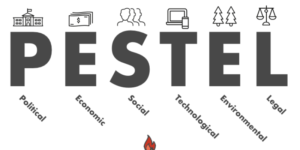Business Management: Overview of Key Study Fields Within the Discipline
Business Management is a multifaceted Discipline that encompasses various fields, all aimed at efficiently running and growing a business. This overview explores the key study fields within Business Management, providing insights into the foundational and advanced concepts essential for aspiring business professionals.
Below is an Overview of Key Study Fields Within the Discipline of Business Management:
1.0 Business Environment
The business environment encompasses understanding of various types of businesses, the functions of an organisation, and the wider business environments in which organisations operate. It also embodies all external and internal factors that influence a company’s operations, decisions, and performance. Understanding the business environment is crucial for strategic planning and decision-making, enabling businesses to navigate challenges and capitalise on opportunities.
2.0 Human Resources and Organisational Behaviour
2.1 Human Resource Management
Human Resource Management (HRM) involves recruiting, training, and retaining employees. It covers areas such as talent acquisition, performance management, employee relations, and compensation and benefits. HRM also emphasises compliance with labour laws and ethical standards.
2.2 Organisational Behaviour
Organisational Behaviour examines how individuals and groups interact within an organisation. It focuses on understanding employee behaviour, motivation, and the dynamics of teams. Key concepts include leadership styles, organisational culture, communication processes, and conflict resolution.
3.0 Strategic Management, Leadership and Change Management
3.1 Strategic Management
Strategic Planning involves setting long-term goals and defining the actions needed to achieve them. This area covers SWOT analysis (Strengths, Weaknesses, Opportunities, Threats), competitive analysis, and the development of strategic initiatives. It aims to align the organisation’s resources and capabilities with its strategic objectives.
3.2 Leadership
Leadership in Business Management focuses on influencing and guiding individuals and teams towards achieving organisational goals. It explores different leadership styles, such as transformational and transactional leadership, and the impact of leadership on organisational performance and employee engagement.
3.3 Change Management
Change Management focuses on preparing, supporting, and helping individuals, teams, and organisations in making organisational change. This field addresses the methods and manners in which a company describes and implements change within both its internal and external processes. The importance of Change Management lies in its ability to help employees understand, commit to, and work effectively during transitions, thereby reducing resistance and improving overall performance.
4.0 Financial Management
4.1 Financial Accounting
Financial Accounting deals with recording, summarising, and reporting financial transactions of a business. It involves preparing financial statements, including the balance sheet, income statement, and cash flow statement. This area ensures transparency and compliance with accounting standards.
4.2 Management Accounting
Managerial Accounting focuses on providing internal management with relevant information for decision-making. It includes budgeting, cost analysis, financial forecasting, and performance evaluation. Managerial accounting helps in planning, controlling, and improving business operations.
4.3 Corporate Finance
Corporate Finance involves managing a company’s financial resources to maximise shareholder value. It covers investment decisions, capital structure, funding strategies, and risk management. Key topics include valuation, mergers and acquisitions, and financial markets.
5.0 Marketing Management
5.1 Marketing Strategy
Marketing Strategy involves identifying target markets and developing a value proposition that meets customer needs. It includes market research, segmentation, positioning, and differentiation. This area emphasises creating and sustaining competitive advantages through effective marketing plans.
5.2 Digital Marketing
Digital Marketing focuses on leveraging online channels to reach and engage customers. It encompasses social media marketing, search engine optimisation (SEO), content marketing, and email marketing. Digital marketing strategies aim to increase brand visibility and drive online sales.
5.3 Customer Services
Customer service is often seen as an extension of marketing because. Customer service studies focus on understanding needs, improving experiences, and fostering strong customer relationships. Key areas include customer behaviour, CRM strategies, service quality management, and drivers of satisfaction and loyalty. Training, service recovery, and cross-cultural communication further enhance effectiveness. Emerging areas highlight technology, analytics, and ethics in shaping service excellence.
6.0 Operations Management
6.1 Supply Chain Management
Supply Chain Management (SCM) involves the coordination of all activities related to sourcing, procurement, production, and distribution of goods. SCM aims to optimise the flow of products and information, reduce costs, and improve customer satisfaction. Key concepts include inventory management, logistics, and supplier relationships.
6.2 Quality Management
Quality Management ensures that products and services meet customer expectations and regulatory requirements. It includes quality control, quality assurance, and continuous improvement practices. Techniques such as Six Sigma and Total Quality Management (TQM) are commonly used to enhance quality and efficiency.
7.0 Information Systems and Technology
7.1 Management Information Systems
Management Information Systems (MIS) focus on the use of information technology to support business operations and decision-making. It covers the design, implementation, and management of IT systems that collect, process, and store data. MIS aims to improve organisational efficiency and effectiveness through technology.
7.2 Business Analytics
Business Analytics involves analysing data to gain insights and support decision-making. It includes descriptive, predictive, and prescriptive analytics. Techniques such as data mining, statistical analysis, and machine learning are used to identify trends, forecast outcomes, and optimise business strategies.
8.0 Entrepreneurship
Entrepreneurship is the study of designing, launching, and running a new business, often starting as a small enterprise. It involves identifying market opportunities, creating a business plan, securing financial resources, and managing operations to achieve growth and profitability. Entrepreneurs are often characterised by their innovation, risk-taking, and proactive approach to seizing business opportunities.
Business Management is a diverse and dynamic field that integrates various disciplines to ensure the successful operation and growth of organisations. By studying these key areas, business professionals can develop the skills and knowledge needed to navigate the complexities of the modern business environment and drive sustainable success.
Bibliography
Armstrong, M. (2016) Armstrong’s Handbook of Human Resource Management Practice. Kogan Page Publishers.
Berk, J., & DeMarzo, P. (2020) Corporate Finance. Pearson.
Bygrave, W. D., & Zacharakis, A. (2014) The Portable MBA in Entrepreneurship. Wiley.
Cameron, E., & Green, M. (2019) Making Sense of Change Management: A Complete Guide to the Models, Tools, and Techniques of Organizational Change. Kogan Page Publishers.
Chaffey, D., & Ellis-Chadwick, F. (2019) Digital Marketing: Strategy, Implementation and Practice. Pearson.
Chopra, S., & Meindl, P. (2016) Supply Chain Management: Strategy, Planning, and Operation. Pearson.
Daft, R. L. (2021) Understanding Management. Cengage Learning.
Davenport, T. H., & Harris, J. G. (2017) Competing on Analytics: The New Science of Winning. Harvard Business Review Press.
Drucker, P. F. (1985) Innovation and Entrepreneurship: Practice and Principles. Harper & Row.
Evans, J. R., & Lindsay, W. M. (2020) Managing for Quality and Performance Excellence. Cengage Learning.
Garrison, R. H., Noreen, E. W., & Brewer, P. C. (2020) Managerial Accounting. McGraw-Hill Education.
Jones, G. R. (2020) Organizational Theory, Design, and Change. Pearson.
Kotler, P., & Keller, K. L. (2016) Marketing Management. Pearson.
Laudon, K. C., & Laudon, J. P. (2020) Management Information Systems: Managing the Digital Firm. Pearson.
Northouse, P. G. (2021) Leadership: Theory and Practice. Sage publications.
Robbins, S. P., & Judge, T. A. (2019) Organizational Behavior. Pearson.
Weygandt, J. J., Kimmel, P. D., & Kieso, D. E. (2018) Financial Accounting. Wiley.
Wheelen, T. L., Hunger, J. D., Hoffman, A. N., & Bamford, C. E. (2017) Strategic Management and Business Policy: Globalization, Innovation and Sustainability. Pearson.









